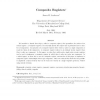6 search results - page 1 / 2 » Fast Mutual Exclusion Algorithms Using Read-Modify-Write and... |
ICPADS
1998
IEEE
13 years 8 months ago
1998
IEEE
: Three fast mutual exclusion algorithms using read-modify-write and atomic read/write registers are presented in a sequence, with an improvement from one to the next. The last alg...
DC
2010
12 years 11 months ago
2010
First-Come-First-Served (FCFS) mutual exclusion (ME) is the problem of ensuring that processes attempting to concurrently access a shared resource do so one by one, in a fair order...
IPPS
2000
IEEE
13 years 9 months ago
2000
IEEE
This paper presents a new methodology for implementing fast synchronization on scalable cache-coherent multiprocessors, through the use of hybrid primitives. Hybrid primitives lev...
PODC
2010
ACM
13 years 4 months ago
2010
ACM
Mutual exclusion is used to coordinate access to shared resources by concurrent processes. k-Exclusion is a variant of mutual exclusion in which up to k processes can simultaneous...
PODC
1990
ACM
13 years 8 months ago
1990
ACM
We introduce a shared data object, called a composite register, that generalizes the notion of an atomic register. A composite register is an array-like shared data object that is...

